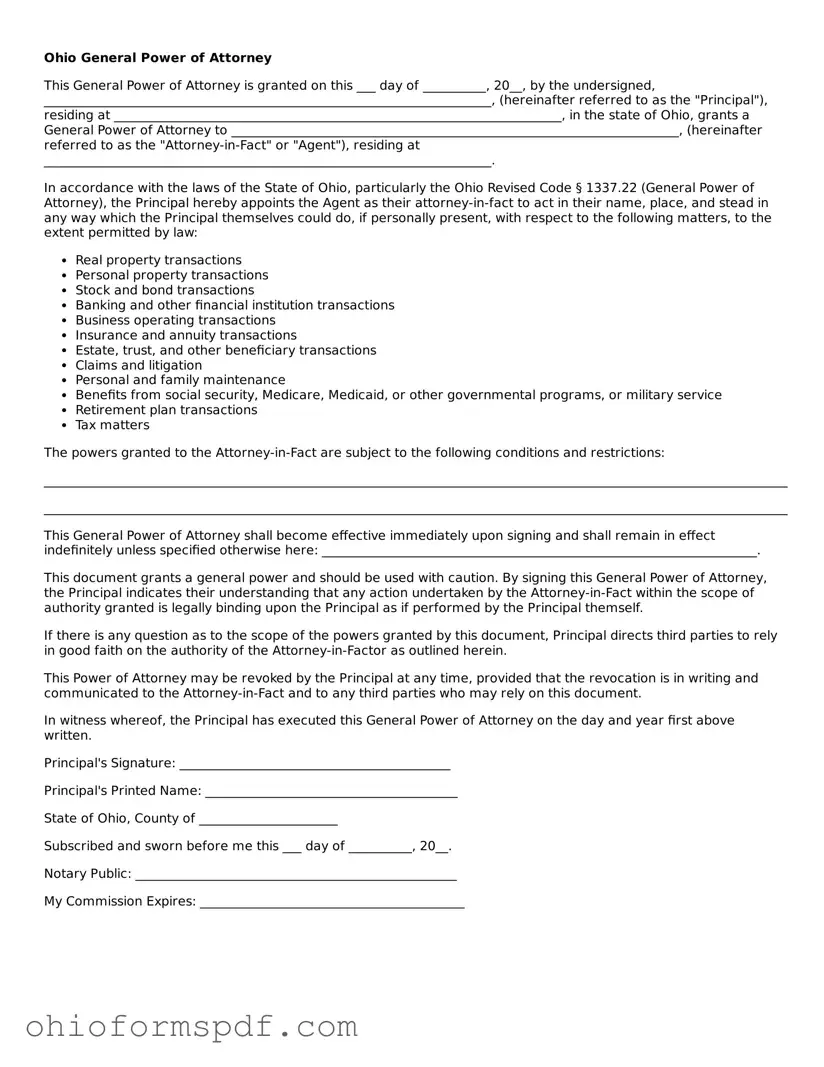Ohio General Power of Attorney
This General Power of Attorney is granted on this ___ day of __________, 20__, by the undersigned, _______________________________________________________________________, (hereinafter referred to as the "Principal"), residing at _______________________________________________________________________, in the state of Ohio, grants a General Power of Attorney to _______________________________________________________________________, (hereinafter referred to as the "Attorney-in-Fact" or "Agent"), residing at _______________________________________________________________________.
In accordance with the laws of the State of Ohio, particularly the Ohio Revised Code § 1337.22 (General Power of Attorney), the Principal hereby appoints the Agent as their attorney-in-fact to act in their name, place, and stead in any way which the Principal themselves could do, if personally present, with respect to the following matters, to the extent permitted by law:
- Real property transactions
- Personal property transactions
- Stock and bond transactions
- Banking and other financial institution transactions
- Business operating transactions
- Insurance and annuity transactions
- Estate, trust, and other beneficiary transactions
- Claims and litigation
- Personal and family maintenance
- Benefits from social security, Medicare, Medicaid, or other governmental programs, or military service
- Retirement plan transactions
- Tax matters
The powers granted to the Attorney-in-Fact are subject to the following conditions and restrictions:
______________________________________________________________________________________________________________________
______________________________________________________________________________________________________________________
This General Power of Attorney shall become effective immediately upon signing and shall remain in effect indefinitely unless specified otherwise here: _____________________________________________________________________.
This document grants a general power and should be used with caution. By signing this General Power of Attorney, the Principal indicates their understanding that any action undertaken by the Attorney-in-Fact within the scope of authority granted is legally binding upon the Principal as if performed by the Principal themself.
If there is any question as to the scope of the powers granted by this document, Principal directs third parties to rely in good faith on the authority of the Attorney-in-Factor as outlined herein.
This Power of Attorney may be revoked by the Principal at any time, provided that the revocation is in writing and communicated to the Attorney-in-Fact and to any third parties who may rely on this document.
In witness whereof, the Principal has executed this General Power of Attorney on the day and year first above written.
Principal's Signature: ___________________________________________
Principal's Printed Name: ________________________________________
State of Ohio, County of ______________________
Subscribed and sworn before me this ___ day of __________, 20__.
Notary Public: ___________________________________________________
My Commission Expires: __________________________________________

